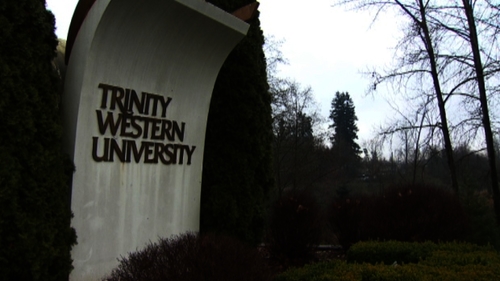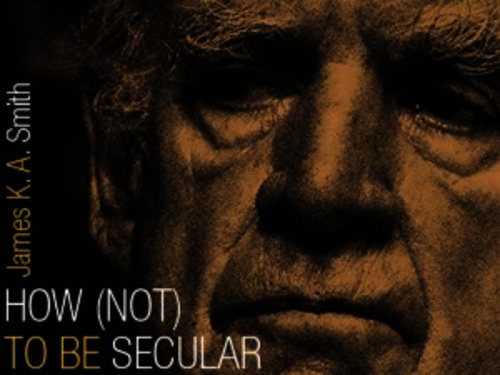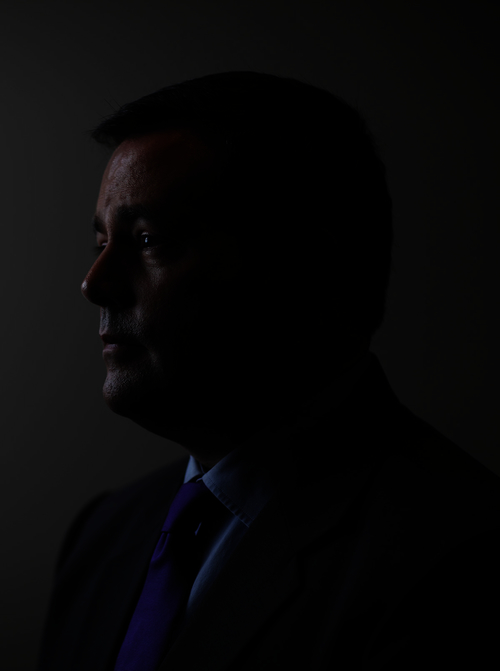Fr. Raymond J. de Souza made a guest appearance on Power and Politics to provide perspective on Justin Trudeau's position on abortion. "Mr. Trudeau says he deeply cares about pro-life people, and then he invites them to sign a pro-choice petition," says Fr. de Souza. "It's a very strange posting on his website." Watch the segment here.

Fr. de Souza criticizes Trudeau’s abortion position
May 20, 2014

Critics keen to put Christian law school out of business
Imagine the largest law society in Canada resorting to the worst faults of monopoly capitalism to score a political point. It’s a frightening prospect whether you regard it from the perspective of the law, politics or business. Yet it’s precisely what the Law Society of Upper Canada fell prey to with its recent vote to bar future graduates of Trinity Western University’s law school from practising their profession in Ontario. TWU is taking the threat so seriously, that it announced Tuesday it has launched legal action against the law society. Toronto lawyer Clayton Ruby, a harsh critic of TWU, is also involved in legal action to block its law school from opening in 2016. In the court of public opinion, criticism of the LSUC’s decision, as well as a similar decision by Nova Scotia’s law society, has focused on it being a violation of religious freedom. TWU is an evangelical Christian institution. The concern that prompted the law society action is the school’s so-called community covenant pledging students to engage in sexual activity only within monogamous, heterosexual marriage. It is understandable to see the controversy as strictly a religious-secular conflict. It’s easy to frame it as a divide between Christian moralism and the discriminatory prohibition of legally married homosexual Canadians from a law school to which they would otherwise be admitted. What gets lost in that perspective, however, is the means by which the Ontario and Nova Scotia law societies have chosen to press their case for their political ideal of inclusivity. It is a classic restraint of trade tactic to put a competitor out of business by using monopoly power to target its suppliers and customers. It is major league sports in the era before players’ associations and free agency. It is Microsoft when it declared users of its operating system could employ only its Explorer browser to connect to the Internet. Controlling the access point conditions every other choice. Consider a hypothetical Ontario student canvassing her options for law school. Her academic record is stellar. She’s socially conscious. She volunteers at food banks. No hint of homophobia mars her past. TWU interests her because she wants training in Christian traditions of the law. While she considers her sexual activity no one’s business, she can abide by the school’s community covenant until graduation. It’s no big deal. What is a big deal is that after graduation, she will be ineligible to practise law in her home province. She will have spent three years at a law school accredited by the B.C. Ministry of Advanced Education and the Canadian Federation of Law Societies. She will have signed a covenant that the Supreme Court of Canada has ruled is a perfectly legal and valid requirement for TWU to require as an evangelical Christian institution. Yet no lawyer’s jobs will be open to her in Ontario. She will not even be considered a lawyer in Ontario since the provincial law society has decided, a priori, to reject her for the school she attended. If she’s bright enough for law school, chances are she’ll weigh the costs and decide TWU simply isn’t worth the candle. Hello, McGill? UBC? Osgoode Hall? Multiply that decision over a decade, and you see the impact of the Law Society of Upper Canada’s vote. It’s the same restraint that oligopolistic sports owners imposed with iron will on generations of athletes, or that Bill Gates sought with the Internet Explorer gambit: You’ll come through me, as I want, if you want to get anywhere at all. The real end game, of course, is driving TWU’s law school out of business. In the great tradition of monopoly capitalists, the majority within both the Ontario and Nova Scotia law societies clearly believe their commitment to preserving the necessary order of the day gives moral justification to skirting or perhaps breaking the law. With actual capitalists, the necessary order is the preservation of pure profit at the expense of all others. In the case of the law societies, it is the preservation of a political order — treated as a given, although it is still very much contested — in which sexual rights trump freedom of religion, of conscience, of mobility, of association and all others. When capitalists try to corner any market, government agencies beat them back with legal sticks. Legions of lawyers, many members of the Law Society of Upper Canada, get into the act. And that, ultimately, is what’s so troubling about the LSUC’s — and its Nova Scotia counterpart’s — actions. It’s not just the underlying anti-religious — even anti-Christian — bigotry. It’s the disrespect for two laws. The first is for the law as settled by the Supreme Court of Canada. The second is for the law of supply and demand that is essential to a free, pluralistic society. Market manipulation is always frightful. When it’s the work of law societies claiming the high moral ground for their own political business, it’s actually something even worse. It’s shameful.
May 7, 2014

The Gospel Coalition’s interview with James K.A. Smith
James K. A. Smith, professor of philosophy at Calvin College, has written a book entitled How (Not) to Be Secular: Reading Charles Taylor (Eerdmans, 2014), interacting with and applying Charles Taylor’s magisterial volume, A Secular Age (Harvard University Press, 2007). Of Smith’s book Tim Keller writes, “As a gateway into Taylor’s thought, this volume (if read widely) could have a major impact on the level of theological leadership that our contemporary church is getting. It could also have a great effect on the quality of our communication and preaching. I highly recommend this book.” Professor Smith was kind enough to answer a few questions. Who is Charles Taylor and why should we care about what he has written? Taylor (b. 1931) is a Canadian philosopher who taught for decades at McGill University in Montreal, though he also held appointments at Oxford and Northwestern over the years. Over the past several years, his work has made a significant impact on my own. I think this is because he sort of “contains multitudes,” as Whitman might say. He is a unique blend of scholar. Taylor is a philosopher who is equally at home in both “analytic” and “continental” camps. But he also puts his philosophical expertise to work on cultural analysis, ranging into history, theology, psychology, economics, and more. Of course, this also gets him into trouble with the specialists, but that’s the price one pays for being a fox and not a hedgehog. Finally, Taylor is a serious Christian public intellectual. He is a Catholic philosopher who is willing to take a stand for his faith, and also willing to argue that his faith perspective makes a difference for theorizing. Indeed, Taylor is an “apologist” of sorts, one who is nuanced, complex, humble, with right-sized expectations of what one can hope to accomplish. Lots of evangelicals are quite fascinated with “apologetics”; I wish more of them were interested in apologists like Taylor. What makes his writing inaccessible for many readers? Ha, good question! I think it’s a combination of things. First, there is just the sheer daunting size of big books like Sources of the Self and especially A Secular Age (900 pages!). Not for the faint of heart. Second, in later books like these, Taylor’s “method” is essentially narratival: he’s helping us make sense of our present by offering an account of our past. He’s kind of a genealogist. So his arguments wend and wind through nooks and crannies of cultural history that can often be foreign to us. I have a couple of my own idiosyncratic hypotheses about his difficulty. For example, I wonder if there’s something about Taylor’s bilingual fluency that actually generates English prose that is kind of tortured. (I find the same experience reading Dutch philosophers for whom English was a second language.) And, to be honest, I think Taylor’s editors at Harvard University Press were just somehow too intimidated by him or something (or maybe Taylor was stubborn!). Because A Secular Age could have been a much better book if it was 2/3 the length. That said, it’s not like he’s unreadable. I suggest reading him while listening to Arcade Fire’s “The Suburbs.” There’s something mutually illuminating in the Quebec connection and their shared sense of “the malaise of modernity”! If that doesn’t work, trying reading some Derrida for a while, and then pick up Taylor. That’ll make Taylor seem clear as day! What is Taylor’s thesis on secularism? Taylor offers a different taxonomy for understanding “the secular,” secularism, and secularity. Most of us, including those who touted “secularization theory,” identify secularization with a-religiosity. In other words, something or someone is “secular” in the sense that they “don’t believe,” are not “religious.” I think this is one of the reasons why outlets like the New York Times or The New Republic can just talk about about religious people as “believers,” whereas everyone else—that is, the editors of NYT and TNR!—are not. If you buy this sort of notion of secularization, then modernity is what Taylor calls one big “subtraction story”: modern Enlightenment rationality is what’s left over when you subtract the superstition of religious belief. Subtract religion, and what you’re left with is “secular” rationality. Taylor doesn’t buy this because, as he tries to show, modernity was not just about the subtraction of God and religious belief; it also required the substitution of something to take its place—what he calls “exclusive humanism,” the belief that one can find meaning and significance without any recourse to the gods of transcendence. For Taylor, even though he ultimately disagrees with it, this is the productive accomplishment of modernity: exclusive humanism is a remarkable feat of addition, not the remainder of some subtraction. You’ll note what’s embedded in his point: exclusive humanism is something you have to believe. So the world is not carved up into “believers” and “secular” rational knowers. It’s a complicated array of different sorts of believers. And that’s why Taylor calls ours a “secular” age: not that we are a-religious or no longer believe, but that we live in an age in which no belief system is axiomatic. Our beliefs are contestable, and we know it. What motivated you to write this book about a book? I taught a senior seminar on A Secular Age with a group of intrepid Calvin College philosophy majors who ploughed through the book with me. In the course of our discussions, it was clear that something in Taylor’s analysis struck an existential chord for them: it helped them make sense of the fraught world they inhabit. As I spent more time with Taylor’s book, I also realized that this would help lots of pastors and church planters better understand “secular” environments like New York or Seattle or Austin. But I realized—and completely understand!—that pastors and practitioners don’t have the time to wade through Taylor’s huge book, so I wanted to try to crystallize and compress his analysis and tie it to some contemporary cultural hooks in a way that could help those who find themselves immersed in such contexts. I’ve talked elsewhere about the necessity for pastors to be ethnographers; I think Taylor’s argument—and hopefully my book—can equip them to do that a little better. I also hope it reframes what it means to engage a “secular” context. If Taylor is right, this shouldn’t be seen as a battle. Instead, we should recognize all the persistent longings for transcendence that characterize our secular age. To proclaim the Gospel in such a context is not a matter of guarding some fortress; it’s an opportunity to invite our neighbors to meet the One they didn’t even realize they’d been longing for. How does Taylor, as a Catholic, understand the Reformation in light of his thesis on secularism, and what do you think about his understanding in light of your own Reformed theology? This is an important question. The answer is, “It’s complicated.” On the one hand, Taylor is quite laudatory about the Reformation and deeply sympathetic. On his account, the Protestant Reformation is part of a broader, late-medieval “Reform” movement that calls into question versions of “two-tiered” Christianity that devalued the faith of laypeople. In Taylor’s formulation, part of the Reformation’s renewal was “the sanctification of ordinary life”—a sense that all of life would be lived coram Deo, before the face of God. So it wasn’t just priests and nuns who had “sacred” vocations; the same could also be true of butchers, bakers, and candlestick makers. Domestic, family life was just as “sacred” as cloistered celibacy, and so forth. For a Kuyperian like me, this sings of “every square inch,” if you know what I mean. On the other hand, Taylor also argues that the Reformation introduced trajectories that would later lead to the “disenchantment” of the world. The story here is “Frankenstein-ish” in the sense that he sees this as an unintended outcome of what were good motives. (Dr. Frankenstein had the best of intentions!) While the Reformers rightly sought to reject superstition, the result was that they sort of de-sacramentalized creation and Christian worship. The world become ontologically “flat” rather than, as Gerard Manley Hopkins put it, “charged” with the grandeur of God. In other words, we’re all Zwinglians now. (Taylor is not the only one to make point this out; consider also the careful argument of historian of science, Peter Harrison, in his important book, The Bible, Protestantism, and the Rise of Natural Science.) As a Protestant, I take this criticism very seriously, even if I might ultimately disagree. But before I defend Protestantism, I think it’s important to hear this and consider in what ways it is true. It should occasion some self-reflection for us. I think the work of J. Todd Billings, for example, is an example of a Reformed, Protestant theologian who, in some ways, is sympathetic to Taylor’s point, but then who shows that the Reformed tradition has resources—right there in Calvin—to counter this picture.
May 1, 2014

Cardus mentioned in The Walrus
In a feature on Min. Jason Kenney in the current issue of The Walrus, writer Marci McDonald sets the scene at Work and Economics event Canada's New Industrial Revolution, at which Min. Kenney, in his role as Minister of Employment and Social Development, was the keynote speaker. Cardus executive vice president Ray Pennings is quoted: Although Kenney has shown an increasing willingness to compromise, friends cannot imagine that, like Harper, he would water down his religious principles for the exigencies of realpolitik. Certainly, they cannot imagine him betraying his pro-life convictions. “These aren’t tags Jason conveniently holds to appeal to a constituency,” says Ray Pennings, executive vice-president of Cardus, a conservative Christian think tank. “This is who he is in his bones.” Convivium editor Fr. Raymond J. de Souza was also quoted in the article, and Ms McDonald mentioned Pennings and de Souza in an interview on CBC's Power and Politics, which you can watch on video here. The full text of the article, which also includes quotes from Convivium editor Fr. Raymond J. de Souza, is available at thewalrus.ca.
May 1, 2014

Pennings: You have nothing to fear from religious schools
When I was in school, merely spouting my opinions (of which I had many) did not get me good marks. Without data and supporting arguments for my opinions, they ended up being dismissed as tripe. That standard is missing from public discourse today, at least with regard to religious schools in Canada. Last week, another in a rash of anti-religious school stories came from Ontario, where a Toronto-area father won the right in court to send his son to a Catholic school while being exempted from all religious programs. The father told the National Post the decision relieves the family of "this prolonged anguish we have been put through." This week's story in that vein comes from Alberta, where the Calgary media seems surprised that a Christian school holds to a traditional view of marriage and an orthodox Christian view of hell. In all such cases, the mere presence of a religiously based school, it seems, qualifies as a threat to civility and decency. Simple orthodox religious expression is treated as shocking intolerance. In the Alberta case, Liberal MLA Kent Hehr, responding to the posting of an orthodox Christian statement of faith on a Christian school’s website, noted: "Fifteen years after the Supreme Court outlawed discrimination on the basis of sexual orientation, it is unbelievable this is still happening." But if our high school lessons about supporting arguments with data were observed, we would find Hehr's claim flies in the face of indisputable facts, as is so often the case with such criticism. The first fact is the Civil Marriage Act passed by Parliament in 2005. The very preamble of the legislation relied on by Hehr notes that "it is not against the public interest to hold and publicly express diverse views on marriage." Often overlooked is that the same clause protecting same-sex marriage from discrimination explicitly reinforces the charter's freedom of conscience and religion provision for "the expression of ... beliefs in respect of marriage as the union of a man and woman to the exclusion of all others based on that guaranteed freedom." The second data point involves nothing less than the Supreme Court of Canada, which has rejected the argument that having a community covenant reflecting traditional views of marriage is in itself discriminatory. In a landmark case, the British Columbia College of Teachers argued that because Trinity Western University had a community covenant, the school should not have the right to grant teacher’s licences. The Supreme Court sided with Trinity Western, noting that there was no evidence raised of discriminatory conduct. The court noted that the "proper place to draw the line is generally between belief and conduct." (It's worth observing the same discredited argument is playing out again as Trinity Western tries to open a law school.) In public skirmishes regarding religious schools, the focus is almost exclusively on the beliefs held. That is not to naively pretend that no occasion will ever be found in which a religious school engages in discriminatory conduct of one sort or the other—just as occurs in school systems that do not have religious statements of faith or community covenants. But to connect the pattern of that discrimination to the existence of a belief system rooted in a respect for every person as an image-bearer of God is a leap supported neither by law nor the evidence. If critics of religious schools did their homework, they would know that, in general, religious schools do at least as good a job—and in many cases, a better job—of achieving the purposes of public education than do public schools. A 2012 Cardus study, based on a representative survey of the Canadian population collected by Angus Reid, with an analysis conducted by the University of Notre Dame, points out that whether the measure is civic engagement, employment, or academic outcomes, non-government schools are achieving what we say we want public schools to achieve. Religious schools are a misunderstood minority that tend to mind their own business and not worry about promoting themselves. That is hardly justification for media, legal and political elites to run roughshod over the clearly established charter rights of religious communities to organize and operate their own schools as an expression of religious freedom. The glib headlines and faux outrage expressed by those critical of religious schools requires more careful argument than is being publicly offered. In fact, if those critics did the required study, they might be surprised whose charter rights are really being offended here.
April 16, 2014

Cooperation and competition should be part of a new Canadian approach to labour policy
For the last few decades, labour policy in Canada has resembled Aesop's mountain in labour. We've heard a lot of rumblings, seen a lot of smoke and hot air, but we have not seen a major restructuring of the ground. A variety of initiatives from the federal Conservatives, as well as controversial proposals on right to work in Ontario and Alberta, have renewed the rumblings, complete with fire and brimstone rhetoric about "attacks on labour" from the union movement. But while the rhetoric and the old union versus non-union policy framework have remained unchanged since the 1970s, the "on-the-ground" realities of labour relations in Canada have changed drastically. We suggest these changes open the door to a new policy framework on labour relations that can move Canadian labour relations in a more innovative, competitive, direction. What are these changes? First, cooperation between unions and employers is more the norm than the exception. The data show that time lost due to strikes and lockouts has been on a steady decline since the 1970s and is currently near an all-time low. Second, collective bargaining is no longer the sole prerogative of traditional trade unions. A wide variety of alternative bargaining arrangements have emerged in the last decade. Among these are alternative unions whose approach to collective bargaining differs both philosophically and structurally from traditional trade unions; human resource departments that mimic the collective bargaining process; creation of private, for profit, organizations which mimic many of the functions formerly performed by trade unions (i.e. labour supply pools, employer organizations); and the emergence of more professional associations and colleges which regulate professions, and which, even incidentally, affect wages, bargaining, and labour standards. Collective bargaining is, in short, a diverse field, even while the main legal framework remains wedded to the traditional union versus. non-union arrangement. Two further changes are well known. Union density (the proportion of paid workers who are union members)in Canada has been trending down for some time, and is hovering at around 31.5%. This number stands alongside a second trend: namely, an increase in the already large gap between union densities in the public sector—currently around 75%—versus those of the private sector—currently around 18%. But beneath those trends lies a less discussed trend: the consolidation of unionized workers into fewer, larger, traditional trade unions via mergers and acquisitions. As Stats Canada notes: Unionized workers are highly concentrated in a small number of large unions […] 46.6% of covered workers in national and international unions belong to just eight unions each covering at least 100,000 workers. In sum, four per cent of unions represent almost half (47%) of Canadian workers. And, if one includes the second tier of unions by size, that concentration increases: 11% of Canadian unions represent 72% of the unionized workforce. This consolidation, combined with the unwillingness—expressed in "no-raid" pacts—of most of these unions to compete for the loyalty of members on the basis of service leads to a trade union movement which is virtually monolithic in form and message. And that message has, overwhelmingly, been anti-conservative. Unions tend to see small "c" conservative policy, and the parties that espouse these policies, as their enemies. They have been willing to spend large sums and mobilize to counter them and to install parties more in line with their views. It should be no surprise that the feeling is mutual. This antipathy displays itself in policy by way of proposals and legislation which aim to use regulation to directly shape how unions and individual workers—and even non-members—interact, either via the way dues are collected, how workers can join a union, or how and to whom unions should report their financial transactions. A recent spate of proposals and legislation are indicative. Federal bills C-377 and C-525, and the recent Ontario Progressive Conservative and Wildrose "right-to-work" proposals all aim directly at unions themselves. The difficulty with this approach is that, all too often, it lends itself to instability in labour policy. The potential for large swings in labour policy—depending on the party currently in power—increases as the common ground between labour and certain segments of political power disappears. Political power, while it might last for considerable periods of time, is never fully secure, and the absence of a consensus on labour policy often resembles a pendulum. The replacement of the NDP Bill 40—introduced by the Rae government—by Bill 7 by the Progressive Conservative government of Mike Harris in the 1990s is but one example. The recent elections in British Columbia also underscore the point. In an economic world where political and labour stability are key factors in investment decisions, this instability can mean lost investment, lost employment and lost government revenues. A better approach recognizes the value of collective bargaining while simultaneously recognizing that major changes in the world of labour relations are already underway under our current regime—and without government intervention. In short, we recommend a policy which encourages competition between the plurality of means of collective bargaining and employer/employee relationships already in existence in the Canadian economy. We suggest that labour policy should focus on three parallel tracks: That, insofar as possible, government refuse to craft policies which deliberately favour a particular method of workplace organization, labour worldview, or labour organization at play in Canadian economic life. Rather, government should enact policy which levels the playing field between the competing views and let civil society determine the most appropriate method. Particular efforts should be made to eliminate laws which allow labour monopolies, or labour oligopolies, or which encourage rent-seeking by labour organizations. Two examples of this are the Saskatchewan government’s Bill 80, which eliminated provisions that gave a few unions a monopoly on collective bargaining in the construction industry, and a private member’s bill in Ontario (Bill 73) that aimed to eliminate the ability of a few private sector unions to control public procurement. We suggest government remove barriers that deliberately penalize one method of organizing workers—whether that be individual contracts, traditional trade union arrangements, alternative unions, or employee associations—and let workers vote with their feet. That the government reevaluate the labour relations regime which currently oversees public sector bargaining, with a view to re-asserting the primary role of the state as government rather than employer in situations where a necessary state monopoly exists. The government should consider its role in the creation of the labour monopolies that exacerbate their fiscal concerns—health care and education for instance—rather than trying to use labour relations policy to solve what are, in effect, unnecessary government monopolies. That the government concentrates on improving and easing the ability of existing workers’ organizations to work towards policy goals where there is a modicum of consensus. Both the right and left agree that workplaces should involve workers as much as possible—i.e. be democratic—while also being accountable primarily to their members. This should be true for all methods of organizing workers, union or otherwise. A policy platform that best fits the framework described above will evaluate each policy through the lenses of competition and cooperation. The facts on the ground suggest that the world of labour relations is changing even in the absence of proposed revolutionary changes such as the removal of the Rand formula. What is needed is not policy that aims to tear down or maintain unions in their current form, but which allows workers the greatest leeway to choose the labour relations environments that serve their individual and collective interests best. A policy that encourages the greatest amount of competition among these various means of organizing workplaces would lead to much more innovation in the world of labour relations than any proposal looking to maintain the status quo, or that aims to upset it by revolutionary measures such as right to work. In short, the ideal would be a policy regime wherein the state encourages the positive aspects of workplace organization where there is a high degree of consensus, while attempting to remain neutral about the ways workers choose to organize themselves. Currently many unions have an unhealthy fear of markets and categorically deny the possibility of a vital union movement in which competition is present. They note that employers will inevitably take advantage of a competitive union world. But unions, like employers, need to come to terms with the notion that competition and cooperation—between employers and unions, between a variety of unions, and between a variety of employers—are integrally linked. As noted by economist Paul Rubin has said: "Cooperation is the heart of economics; competition is a tool for obtaining better cooperation." Our framework and policy proposals suggest a way forward for labour relations in Canada. Such an approach would see the state allow the full range of players in the labour relations "market"—including the variety of labour relations models present on the ground today—to compete toward the goal of greater innovation, greater productivity and a fair distribution of the wealth generated by economic activity.
April 16, 2014

Ray Pennings says: Don’t be afraid of religious schools
In a Calgary Herald op-ed yesterday, Cardus executive vice president Ray Pennings encouraged critics not to fear religious schools. Regarding cases such as the concern over Trinity Western University's community covenant, Pennings says: "...to connect the pattern of that discrimination to the existence of a belief system rooted in a respect for every person as an image-bearer of God is a leap supported neither by law nor the evidence. If critics of religious schools did their homework, they would know that, in general, religious schools do at least as good a job—and in many cases, a better job—of achieving the purposes of public education than do public schools. The complete article can be found at the Calgary Herald website.
April 16, 2014

Brian Dijkema published in <i>Inside Policy</i>
Published in the April 2004 issue of Inside Policy, "Cooperation and competition should be part of a new Canadian approach to labour policy" by Brian Dijkema suggests that what is needed in the world of labour relations is not policy that aims to tear down or maintain unions in their current form, but which allows workers the greatest leeway to choose the environments that best serve their individual and collective interests. Read the full article here.
April 15, 2014

CBC’s ‘The Public God’ forum featured Father Raymond J. de Souza and Janet Epp Buckingham
CBC's The Sunday Edition, hosted by Michael Enright, featured a program yesterday entitled: "The Public God—A Forum on the Role of Religion in Public Policy." Panelists included Rev. Gretta Vosper, Alia Hogben, and Moustafa Bayoumi, plus Convivium magazine editor-in-chief Fr. Raymond J. de Souza and Cardus senior fellow Janet Epp Buckingham. "As much as possible," said Buckingham, a lawyer and professor at Trinity Western University, "we do need to allow people to live within their conscientiously and deeply held beliefs, but you have to separate professional obligations from personal beliefs." Regarding Canada's Office of Religious Freedom, Fr. de Souza remarked: "Religious persecution is a massive problem. ... We're talking about massacres—every month, dozens and dozens, sometimes hundreds of Christians being killed. It's not only Christians; the Office of Religious Freedom deals with other minorities too. Religious freedom is one particular freedom that is a bellwether and indicates the general state of freedoms, and I think religious freedom, as highlighted by this government as part of their foreign policy, is a plus." Hear the entire program at the CBC website.
April 13, 2014
Media Contact
Daniel Proussalidis
Director of Communications
